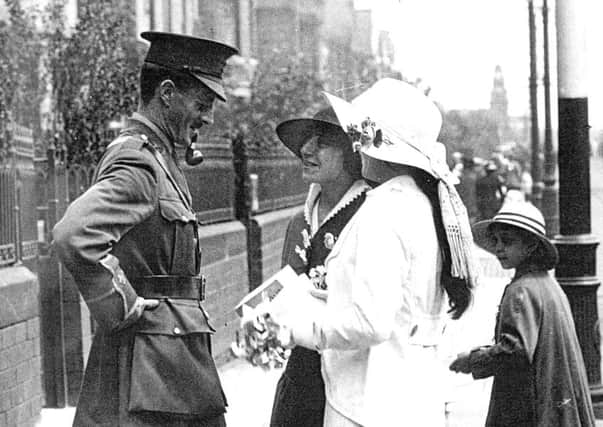Armistice 100: Remembering when the guns of the First World War fell silent


Thanks to the exhaustive research of historian Dorothy Ramser this is the story of how local people celebrated that historic moment.
“The Prime Minister made the official announcement in London at 10.30am,” said Dorothy, “and from there news filtered to the provinces – however, it was known all over North Shields by 8.30am.
Advertisement
Hide AdAdvertisement
Hide Ad“At 10 minutes past eight, two trawler patrols sailed into Shields harbour displaying an unusual amount of brightly coloured bunting.
“The buyers haggling on the fish quay stared at them with puzzlement.
“A few minutes later, word came ashore from one of the Royal Navy ships, off North Shields, that a wireless message had been picked up, stating that the armistice had been signed.”
As a result, all the fishing boats started sounding their steam whistles and the noise was “deafening”.
Advertisement
Hide AdAdvertisement
Hide Ad“This was imitated by every other craft on the Tyne and the shipyards and factories all joined in too with their hooters and klaxons. The church bells rang and the town wild with happiness.
“Impromptu entertainments were hastily organised in the soldiers’ hospitals, billets and YMCA.
“South Shields reacted in the same way – and rejoicing filled the air.
“The river resounded with the din of sirens.
“Before 9am workmen were seen hurriedly wending their way home from work. In front of the Town Hall national flags of all Allied countries were stretched across the main road.
Advertisement
Hide AdAdvertisement
Hide Ad“The streets filled rapidly and people began cheering, and servicemen among them, were rightly feted as heroes. At 11am when official news of the Armistice arrived, the sirens were still sounding and vessels all over the Tyne were covered with flags and streamers of bunting.
“Trams stopped running, shops closed and everyone was wearing red, white and blue on their clothes.”
In the afternoon, the Mayor appeared, wearing his scarlet robes and chains of office to address the crowd in front of the Town Hall, making his Armistice speech.
“The Durham Light Infantry band, in the forecourt, played the National Anthem and ended with God Save the King!
Advertisement
Hide AdAdvertisement
Hide Ad“On the local farms, the news was received with great joy and many farmers immediately granted a full day’s holiday. The killing of a pig for a feast took place on some and singing could be heard in the fields.
“Jarrow and Hebburn were alerted to the news of the Armistice by the deafening noise from the river.
“On hearing it, the shipyard workers immediately downed tools and rushed to the gates and were met by the sight of cheering throngs of people who had run excitedly from shops and homes.
“The church bells ringing added to the joy of the moment. Flags were hung from windows and all the businesses in the towns closed, and it became a public holiday as bands paraded on the streets and thanksgiving services were held in local churches.
In the evening, the theatres and cinemas were crowded.
Advertisement
Hide AdAdvertisement
Hide Ad“Bands of soldiers and sailors marched arm in arm, singing the popular tunes of the day, like the rousing ‘Pack Up Your Troubles’ and ‘It’s A Long Way To Tipperary’.
“The removal of food restrictions in hotels, cafes and restaurants led to a huge increase in customers wanting to celebrate, and many people dined together in the jolly party atmosphere.
“The streets of the region could once more be lit, because, for over two years, there hadn’t been a light from a shop window or street lamp except at some corners where a weak gleam was allowed via a shaded bulb.
“It was said you could walk in Shields, through crowded streets, and not recognise anyone. Even so, the lighting was to be limited to conserve coal.”
Advertisement
Hide AdAdvertisement
Hide AdOn November 11, the prisoner of war funds, which had paid for the food, clothing and essential items sent to alleviate the starvation and misery of the town’s soldiers held in camps, came to an end.
“In the week following the Armistice, plans were also set in motion in the town to raise funds for a memorial for our men, who had lost their lives in war.
“Soon the men who had survived the terrible conflict could start to return ... to their families who had missed them for so long.”
l Tomorrow we tell the tragic story of the South Shields couple for whom the Armistice came just too late – their youngest son died 11 days beforehand – and their daughter, the very day of the cessation of hostilities.